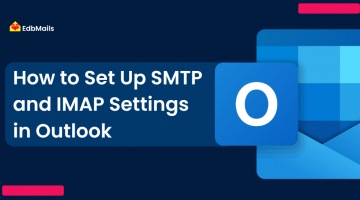When an Exchange Server database (EDB file) goes offline or becomes corrupted, organizations risk losing critical communication data such as emails, calendars, contacts, and public folders. Causes can range from server crashes, dirty shutdowns, hardware failures, missing log files, or malware attacks.
Native methods like Windows Server Backup or Exchange Management Shell may help in some cases, but they often fail with severely corrupted databases. To ensure successful recovery, IT admins rely on specialized tools like EdbMails Exchange Recovery, which supports:
- Exporting EDB to PST for backup and archiving
- Restoring EDB to Live Exchange servers
- Migrating EDB directly to Office 365
The following sections explain each recovery option in detail.
Step-by-Step Guide: Export EDB to PST
Exporting EDB mailboxes to PST is useful when you want an Outlook-compatible backup or need to archive old mailboxes.
Steps:
- Download and Install EdbMails
- Select EDB to PST
- Select the EDB File
- Select Location to store PST file
- Select Mailboxes to Export EDB to PST
- Choose Export Option.
- Start PST Export
👉Detailed Guide: Recover and convert EDB to PST
Step-by-Step Guide: Migrate EDB to Office 365
If your organization is moving to Microsoft 365, restoring EDB directly to Office 365 saves time compared to manual migration methods.
Steps:
- Install EdbMails
- Choose EDB to Office 365 Migration
- Browse EDB file
- Select Mailboxes
- Connect to Office 365 Tenant
- Load Mailboxes
- Mailbox Mapping
- Start Migration
👉Detailed Guide: EDB to Office 365 migration step by step
Step-by-Step Guide: Restore EDB to Live Exchange
For organizations running on-premises Exchange, restoring mailboxes from an offline EDB to a new or existing Exchange server ensures minimal downtime.
Steps:
- Download EdbMails
- Choose EDB to Live Exchange
- Browse and Select the EDB file
- Select the Mailboxes
- Connect to Target Exchange Server
- Load and Map Mailboxes
- Start the Migration
👉Detailed Guide: Migrate EDB to Live Exchange server
Key Benefits of Using EdbMails
- Supports all Exchange versions: 2019, 2016, 2013, 2010, 2007, 2003
- Recovers unlimited mailboxes without file size restrictions
- Maintains data integrity and folder hierarchy
- Advanced filters for selective recovery
- Supports Public Folder and Archive Mailbox migration
- Works without Exchange Server or Active Directory dependency
- Trusted by organizations worldwide
Conclusion
Recovering a corrupted Exchange Server database is crucial for ensuring business continuity. Manual methods can be complex and unreliable, especially with severely damaged EDB files. EdbMails Exchange Recovery Tool provides a complete solution to:
- Export EDB to PST for backup and Outlook access
- Restore EDB to Live Exchange for on-premises environments
- Migrate EDB to Office 365 for cloud adoption



